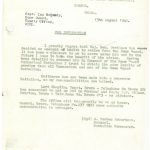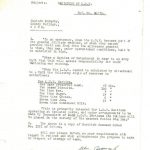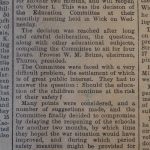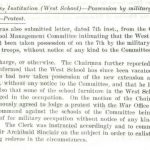On Tuesday 13 August, Germany finally launched Adlertag or “Eagle Day”, the start of a two-week assault on British airfields in an attempt to weaken the RAF sufficiently to allow the invasion of Britain. Despite inflicting serious casualties the Luftwaffe ran into unexpected resistance: on just one day, Thursday 15 August, 75 German planes were shot down for the loss of 30 British. Sunday 18 August saw the greatest numbers of casualties on either side, after which bad weather gave the Luftwaffe a chance to take stock; since 8 August they had lost 332 planes to the RAF’s 175. As a result of these heavy losses, the “Stuka” dive-bomber was withdrawn from the battle.
 Meanwhile, German attacks on merchant shipping off the coast of Caithness continued unabated, leading to a steady stream of refugees passing south. On 13 August the police recorded that “seven Dutch survivors were landed at Scrabster tonight from the S.S. “St. Ninian” and were taken to the Pentland Hotel, Thurso. They are in the charge of the local Immigration Officer, and they will probably leave for the South tomorrow”.
Meanwhile, German attacks on merchant shipping off the coast of Caithness continued unabated, leading to a steady stream of refugees passing south. On 13 August the police recorded that “seven Dutch survivors were landed at Scrabster tonight from the S.S. “St. Ninian” and were taken to the Pentland Hotel, Thurso. They are in the charge of the local Immigration Officer, and they will probably leave for the South tomorrow”.

This week the Caithness Home Guard was formed into a separate Battalion, following the retirement of the previous commander of the joint Sutherland and Caithness Home Guard.
 The Home Guard was organised into districts and companies. The Caithness Northern District at this time had some 489 men serving in it, divided into 3 platoons, and 15 sections, with each section consisting of some 30 men.
The Home Guard was organised into districts and companies. The Caithness Northern District at this time had some 489 men serving in it, divided into 3 platoons, and 15 sections, with each section consisting of some 30 men.
The rations for a section operating at isolated posts in an emergency had been laid down the  previous month: one case of preserved meat; two cases of biscuits; two tins of tea; two tins of sugar; three tins of cheese; seven tins of jam; and seven tins of condensed milk. (Of course, it doesn’t say how long the rations were supposed to last!)
previous month: one case of preserved meat; two cases of biscuits; two tins of tea; two tins of sugar; three tins of cheese; seven tins of jam; and seven tins of condensed milk. (Of course, it doesn’t say how long the rations were supposed to last!)
 Meanwhile schools in Caithness, which had broken up for the summer holidays back in June, would now remain closed until 1 October, “by which time they hoped the war situation would have improved, and during which period safety measures might be provided for the schools”.
Meanwhile schools in Caithness, which had broken up for the summer holidays back in June, would now remain closed until 1 October, “by which time they hoped the war situation would have improved, and during which period safety measures might be provided for the schools”.
Finally this week, the County Education Committee learned that “the West School, Thurso, had been taken possession of on the 7th by the military for the billeting of troops,” without notice of any kind being given. The troops had since vacated West School and taken possession of the new extension at Miller Institution, leaving behind a quantity of damaged furniture. The Committee, unsurprisingly, decided to lodge a protest with the military and “obtain redress”.
had been taken possession of on the 7th by the military for the billeting of troops,” without notice of any kind being given. The troops had since vacated West School and taken possession of the new extension at Miller Institution, leaving behind a quantity of damaged furniture. The Committee, unsurprisingly, decided to lodge a protest with the military and “obtain redress”.
